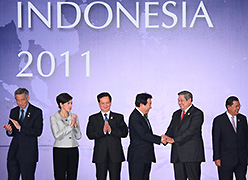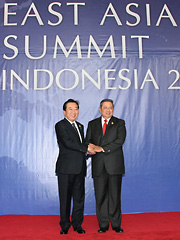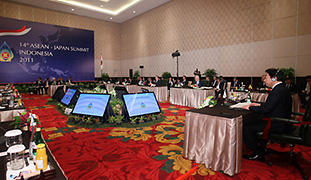14th ASEAN-Japan Summit (Overview)
November 18, 2011

Group photograph before the Japan-ASEAN Summit Meeting
Photograph of Prime Minister Noda being welcomed by President Susilo Bambang Yudhoyono of Indonesia
Photograph of the Japan-ASEAN Summit Meeting
(Photos: Cabinet Public Relations Office)
The 14th Japan-ASEAN Summit Meeting was held at the Bali Nusa Dua Convention Center in Bali, the Republic of Indonesia, on November 18 under the chairmanship by H.E.Dr. Susilo Bambang Yudhoyono, President of the Republic of Indonesia. Representing Japan was Prime Minister Yoshihiko Noda. A summary of the Summit Meeting is as follows;
1. Review and future direction of ASEAN-Japan Cooperation
- (1) At the start of the meeting, Prime Minister Noda conveyed words of sympathy to Thailand, Cambodia, Myanmar, Vietnam, Laos and the Philippines for damage caused by natural disasters and offered to extend as much assistance as possible in the future as well. He also expressed his gratitude for support given by ASEAN member states in the aftermath of the Great East Japan Earthquake and stated that Japan would move ahead forcefully with its restoration work.
- (2) Furthermore, Prime Minister emphasized that the Bali Summit was historically significant as it was scheduled to adopt a new ASEAN-Japan joint declaration for the first time in eight years.
- (3) Prime Minister Noda also said Japan would actively support ASEAN in building an ASEAN community in 2015. At the same time, he explained that Japan considered the enhancement of connectivity pushed by ASEAN as a significant challenge and that Japan was addressing it at the ministerial level as a priority issue. In this connection, he assured that Japan would extend assistance focusing on improvements of " Formation of the Vital Artery for East-West and Southern Economic Corridor" and "Maritime Economic Corridor," as well as projects of software infrastructure throughout the ASEAN region as its pillars. Moreover, he furnished a "List of flagship projects for enhancing ASEAN Connectivity" comprising major projects conducive to enhancing connectivity. With the total cost of the projects estimated at about 2 trillion yen(equivalent to about 25 billion USD), he pointed to the need for fund procurements for the implementation of the projects through such means as official development assistance (ODA) and the Japan Bank for International Cooperation (JBIC) as well as a sort of mechanism to mobilize private-sector funds.
- (4) Prime Minister Noda went on to say Japan would cooperate with Myanmar in conducting a comprehensive development survey involving such matters as the development of special economic zones upon the request of the Government of Republic of the Union of Myanmar. He expressed that the step to extend cooperation was to be taken on the basis of positive moves in Myanmar, which had been a vacuum in terms of Japan's assistance, in order to enhance connectivity. Also, based on the formal decision by the ASEAN Summit on November 17 to name Myanmar as the chair of ASEAN meetings in 2014, Prime Minister Noda expressed hope that Myanmar would fulfill its responsibilities as chair, further promote domestic democratization and national reconciliation, and contribute to regional stability as a responsible member of the international community.
- (5) As a means to strengthen cooperation in the area of disaster management, Prime Minister Noda said Japan would help the ASEAN Coordinating Center for Humanitarian Assistance on Disaster Management (AHA Center) develop as a regional hub of disaster management. At the same time, he said Japan would launch efforts to establish a "Disaster Management Network for ASEAN Region." Also, he referred to other relevant efforts, such as inviting disaster management personnel to Japan and hosting an international conference for the purpose of sharing experiences in and lessons-learned from the Great East Japan Earthquake. Furthermore, he promised cooperation in holding the ASEAN Regional Forum (ARF) Disaster Relief Exercise at regular base.
- (6) Prime Minister Noda touched on youth exchange, saying the "Japan-East Asia Network of Exchange for Students and Youths" (JENESYS) program had made significant achievements and adding that youth exchanges constituting a basis for ASEAN-Japan relations remained important. He explained that Japan was studying the possibility of realizing exchanges among about 3,000 young people in Japan and ASEAN by the end of 2013.
- (7) ASEAN participants welcomed Prime Minister Noda for attending a meeting with ASEAN leaders for the first time. They also expressed appreciation for assistance Japan had extended to some ASEAN member states stricken with natural disasters. With admiration for Japanese efforts and achievements in post-disaster restoration work, they voiced their readiness to continue supporting Japan. Furthermore, they mentioned the importance of the long-standing ASEAN-Japan friendly and strategic partnership for peace, stability and expansion of prosperity in the region. They also welcomed and highly valued new measures Japan had taken, including active support for enhancing ASEAN connectivity, concrete initiatives in the field of disaster management and the study on implementation of a new youth exchange program. In addition, they welcomed the proposed new ASEAN-Japan joint declaration and the plan of action to be drawn up on this occasion.
2. Regional and International Situations
- (1) Prime Minister Noda expressed views on maritime cooperation, the situation in North Korea and reform of the U.N. Security Council.
- (2) Speaking on maritime cooperation, Prime Minister Noda stressed the importance of having fundamental maritime rules on peaceful dispute settlement, freedom of navigation and observance of international law on the ground that the ocean linking the Asia-Pacific region was public goods. As for ways to maintain cooperation, he said it would be useful to establish a venue for a free exchange of views among relevant government officials and experts and asked for understanding and cooperation of ASEAN member states.
- (3) Regarding the North Korean situation, the ASEAN member states' support for the efforts toward North Korea's denuclearization and for the steady implementation of the relevant U.N. Security Council resolutions was confirmed. Prime Minister Noda requested the ASEAN member states' cooperation on the abduction issue and on the adoption of the U.N. resolution on the situation of human rights in North Korea.
- (4) Regarding Security Council reform, Prime Minister conveyed to ASEAN member states Japan's hope to strengthen ASEAN-Japan cooperation for early realization of the reform.
3. New Joint Declaration and Plan of Action
At the conclusion of the Summit, President Yudhoyono declared the new joint declaration and plan of action adopted, the first actions of the kind in the eight years since the Tokyo Declaration and the ASEAN-Japan Plan of Action were adopted in 2003.
In this connection, Prime Minister Noda proposed that the new declaration be named the "Bali Declaration" after the Indonesian island where the Summit was held and received endorsement from those present. He said Japan would continue to strive to bolster ASEAN-Japan cooperation in accordance with the principles incorporated into the Bali Declaration and the ASEAN-Japan Plan of Action and asked for cooperation from the ASEAN leaders.
Back to Index
